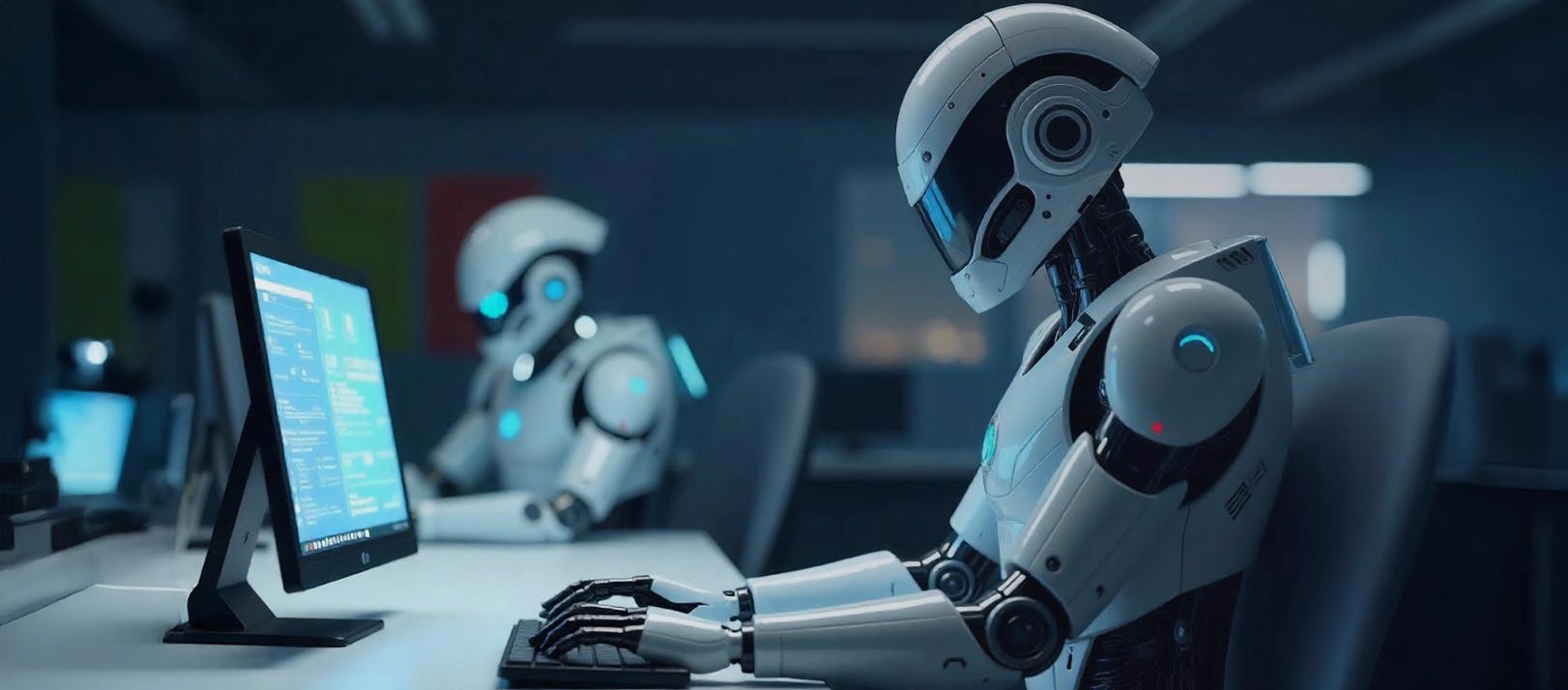
Integration of AI Agents in Enterprise Systems: A Guide to Agentic Workflows
In the last 10 years, Artificial Intelligence (AI) has turned into a significant part of enterprise systems that change traditional business processes and decision-making models. AI programs initially automate simple and repetitive duties. However, its role has grown from being a tool for following directions to a decision-making entity that can act proactively and handle complex workflows independently.
One of the most significant signs of the change is seen in agentic workflows, an innovative method that involves integrating AI agents directly into enterprise processes. Such systems represent a step ahead of traditional artificial intelligence because they are capable of autonomy, reasoning and adaptability which used to belong only to human beings in the past. These workflows do not just perform tasks automatically; rather, they create AI partners that can understand situations, set objectives and deal with various difficulties for attaining best possible results.
How Agentic Workflows Can Revolutionize Enterprise Operations?
Agentic workflows are changing how businesses operate by making things more proactive and goal-driven. Unlike traditional AI systems that just follow instructions, agentic workflows understand the environment and set their own objectives.
They can then take steps to achieve those goals without needing someone to constantly watch over them. This marks a huge change in how enterprise systems work. Traditional systems are reactive - they just respond to commands or stick to pre-set paths. But agentic workflows are proactive and have their own goals in mind. They don't require human oversight all the time, which is a major shift in how businesses operate. Agentic workflows can analyze their surroundings, identify objectives, and independently carry out necessary actions to meet those objectives
An agentic AI system has the ability to function independently, like having a talented team that works tirelessly around the clock. For example, in managing supply chains, an agentic AI could continuously watch global trends. It could predict changes in demand and automatically adjust how products are ordered and delivered. The AI would do this in real-time, without needing human input. This level of responsiveness and forward-thinking can greatly reduce inefficiencies and lower costs. It can also make supply chains more resilient and better in terms of handling disruptions. With an agentic AI overseeing operations, companies can ensure their supply chains run smoothly and efficiently at all times.
Agentic workflows have the power to change how businesses interact with their customers as well. Picture this: Smart AI agents that don't just respond to questions but actively anticipate a customer's needs. These AI agents can personalize each interaction based on the customer's past behaviors and preferences.
By enabling this shift from reactive to proactive customer interactions, agentic workflows are set to redefine how we interact with technology in the business world. These tools will evolve from simple task executors into collaborative partners. They will not only carry out tasks but also comprehend and optimize entire processes. This remarkable transformation promises to explore new heights of efficiency, innovation, and competitive advantage for businesses willing to adopt the agentic AI development.
What are Agentic Workflows?
The central focus of agentic workflows is AI agents which are complex software entities that execute tasks and interact with users using artificial intelligence and machine learning. These are not static systems following rules; they are adaptive problem solvers capable of self-improvement over time. This flexibility enables them to manage intricate and constantly changing operations hence being instrumental in the automation and optimization of agentic workflows.
Key Characteristics of Agentic Workflows
Let us find out key characteristics of agentic workflow and how the integration of AI agents helps to make enterprise systems more efficient.
Data Integration and Processing
AI agents are really good at getting and working with information from many different places. They can easily put together data from different computer systems, big databases, and even sources outside the company. This ability to combine and understand a lot of information allows AI agents to give a complete picture of how a business works. For example, at a bank, an AI agent might look at market trends, how customers spend money, and the economy around the world to give personalized advice on investing money.
Decision-Making
AI-powered analytics help make smart decisions by carefully studying information. They don't just show data, but analyze it deeply to understand what's going on. AI agents look at all the details and explore different options before making a choice. This is more than just simple rules. They use complex methods to predict what might happen next. For example, in healthcare, an AI agent could study a patient's medical records, current symptoms, and the latest research. It would then suggest what might be wrong and how to treat it. As new information comes in, the AI would update its recommendations. AI analytics make decisions by considering all the facts, not just following basic instructions.
Continuous Learning and Improvement
Learning and improving is an ongoing process for agentic workflows. Every complete task and every interaction helps the AI agent become smarter. Feedback plays a key role in this learning process. For instance, when customers rate their experience with an AI agent at a service center, or when an AI-optimized manufacturing process results in better efficiency, this information is fed back into the system.
The AI agent uses the experience to enhance its strategies and responses over time. This adaptability ensures that agentic workflows don't just maintain performance but continuously evolve to meet changing needs and deliver better outcomes. The AI agent is always learning, always growing, always becoming more capable through an endless cycle of feedback, reflection, and refinement.
Benefits of AI Agents in Enterprise Environments
When AI agents are integrated into enterprise systems using agentic workflows, many benefits can greatly affect an organization's productivity and profitability.

Efficiency Improvements and Cost Reductions
AI agents can automate complex tasks and streamline workflows to reduce the time and resources needed for different business processes. AI agents do not get tired, make mistakes from tiredness or distraction; they can operate 24/7 without any breaks at all. In industries such as manufacturing or supply chain management, this may result in significant savings through error minimization, quicker processing times as well as smarter resource utilization.
Enhanced Decision-Making Capabilities
Artificial intelligence (AI) agents are great tools that can help us make better choices. They are really good at looking at lots of information and finding patterns that people might miss. AI can quickly look through huge amounts of data to find trends and use that to predict what might happen in the future. This is super helpful for things like assessing risks. AI can look at many different risk factors all at the same time and give us insights to help make smarter decisions. Without AI, it would be really hard for people to process so much information and spot all the patterns. But with AI's help, we can make choices based on a much deeper understanding of the data.
Scalability and Adaptability
AI agents are highly scalable. When business needs grow or change, there are no delays or additional costs for expanding the workforce of AI agents compared to human workers. AI agents can quickly scale their operations up when faced with more customer queries or a different marketing strategy. Additionally, by being able to learn and adapt, they can easily adjust themselves to altered business environments, hence making organizations more agile in responding to market dynamics.
Future Implications in Agentic Workflows
Looking ahead, there are several trends expected to augment the capabilities and influence of agentic workflows even more:

Deeper Integration with IoT and Edge Computing
AI agents will gain access to a greater amount of data through the spread of Internet of Things (IoT) devices, which in turn will allow them to understand and control physical processes more effectively. At the same time, edge computing will enable such agents to take instant decisions at the place where information is created thus further speeding up agentic workflows.
Advanced Natural Language Understanding
Better understanding and processing of human languages by artificial intelligence will be achieved due to the breakthroughs in natural language processing. AI will become more human-like when conversing with people, plus it will handle complex and ambiguous commands effectively.
Multi-Agent Collaboration
Teams with different skills from several AI agents will perform a variety of complicated tasks in the future. These multiple systems are capable of instant communication just as humans do today for quick problem-solving among other benefits associated with perfect coordination.
Conclusion
Integrating AI agents into corporate systems via agentic workflows significantly changes how businesses do things. Giving AI systems independence, logic and flexibility, agentic workflows redefine work beyond merely performing tasks automatically. They point towards a future where AI coworkers will work with human staff members, taking care of complicated assignments, making decisions based on data as well as continually learning so as to enhance their effectiveness.
However, this is not an easy process. We must handle transparency issues and use ethical AI very carefully. Human oversight is also required but in a very critical way. Therefore, we can say that responsible development and deployment of agentic workflows into organizations may make them more productive than ever before while also bringing about new innovations.
Codiste, being one of the best AI development companies, is setting the pace for creating and implementing agentive workflows. They have expertise in developing complex AI agents that work harmoniously with current business systems which is enabling different industries to maximize the capability of agentive AI. Through advanced solutions provided by Codiste not only do enterprises keep up with this development but they lead by example setting new standards of efficiency, decision making and adaptability in a world increasingly run by artificial intelligence.



AI in Customer Service: Trends & Predict...
Know more
A Deep Dive into How Agentic RAG Automat...
Know more
Is Agentic RAG Worth the Investment? Age...
Know more
